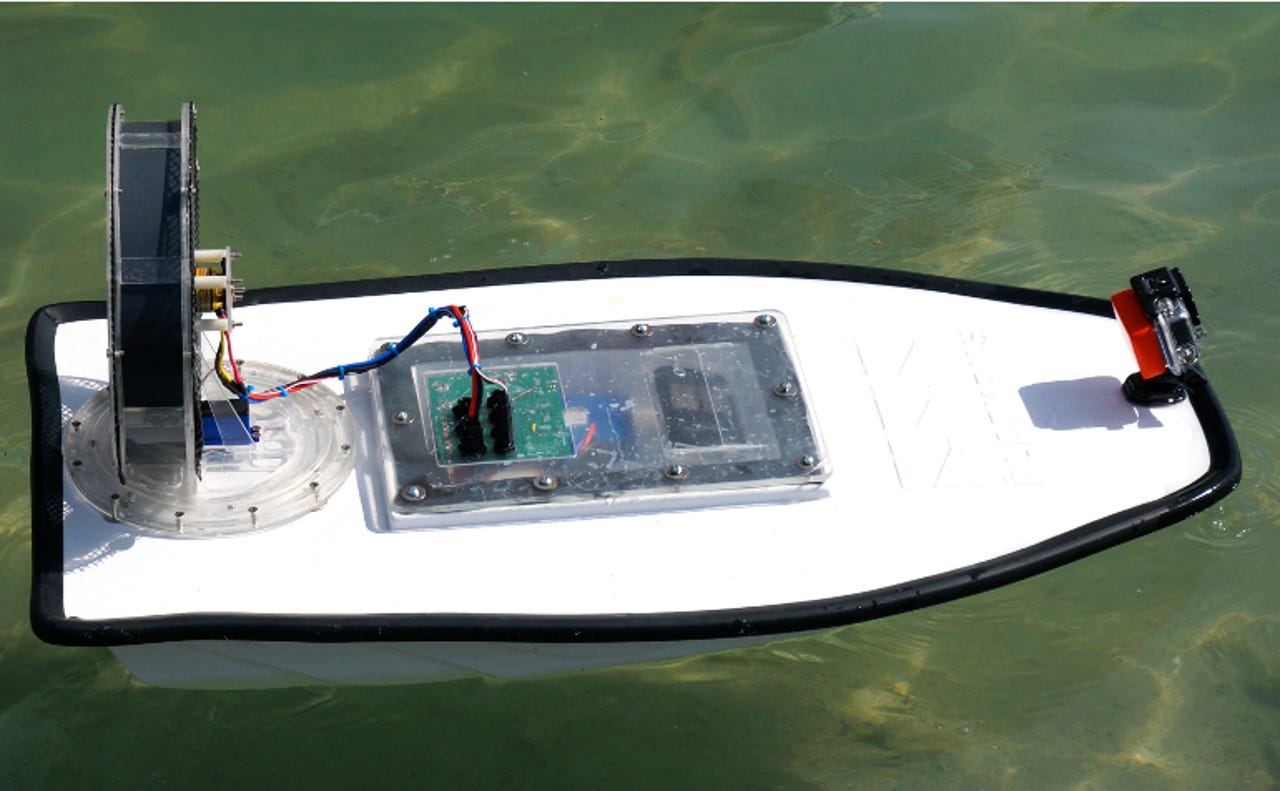From Lake Garda to the Thames: Why boat drones are taking to the water


As well as a custom electronics board and sensors, each robot boat is equipped with an Android smartphone for comms, GPS, and compass.
Researchers are using low-cost drones and artificial intelligence to test water quality in some of Europe's most important rivers and lakes in one of the sector's most ambitious projects this year.
Funded with €8.7m ($9.1m) from the EU as part of the Horizon 2020 program, the project is known as the "development and application of novel, integrated tools for monitoring and managing catchments", or IntCatch for short.
It will focus on analyzing the health and quality of four strategic reservoirs of drinking water: the Garda and Yliki lakes in Italy and Greece respectively, the river Thames in the UK, and the river Ter, which provides water to Barcelona, Spain.
"Our goal is to understand and validate the impact of different water treatment methods and infrastructures on the health of river and lakes, collecting real-time data on parameters such as pH, conductivity, the presence of heavy metals and hydrocarbon in water and more," Francesco Fatone, IntCatch's environmental activities coordinator for the University of Verona, one of the project's partners, tells ZDNet.
See also
The project, which has been presented to the public in Peschiera del Garda near Verona, will officially start in June, and continue until the end of January 2020.
Forty-four months of research and experiments will be carried out by six major European universities and 14 other private and public companies and institutions, with London's Brunel University coordinating the efforts.
One of the key elements of IntCatch is the use of fleets of radio-controlled boats to collect and analyze sample of waters. Unlike the drones developed in other similar initiatives, which can cost as much as €20,000 each, those engineered by Italian researchers are low-cost machines.
"Our drones cost less than €5,000 each," University of Verona's researcher Alessandro Farinelli tells ZDNet.
"They aren't built from scratch, but rather commercially available boats that we engineer with low-cost sensors to monitor the quality of waters."
For geolocation, for instance, a smartphone's GPS is used. The main controller is an Arduino board, and the batteries that power up the devices are similar to those used for hobby modeling.
"The drones possess a sort of artificial intelligence, an algorithm, which allows them to coordinate with each other, making it possible for a single operator to control a small fleet of boats, of three to five drones," Farinelli says.
The other key source of environmental data will be the analysis of the genome of the bacteria in the water, using DNA test kits. All the evidence collected will be then transferred to the cloud, and processed by software to assess the changes in the biology of waters, and impact of human actions on river and lakes.
"We'll try to answer questions like, 'What's the impact of storm waters? Is it worth treating them? What's the impact of pesticides or tourist activities?'," the University of Verona's Fatone says.
The public will also be engaged, not only through demonstration activities to showcase the project's inner workings, but also by asking for their support in decision-making and raising their awareness about the environmental consequences of different methods of surface waters management.
The online database of water quality data will be accessible by anyone, using a web or mobile interface, only the amount of detail in the information presented might vary, based on the user's expertise. People will also be able to query the database to improve their knowledge of the aquatic ecosystems in their vicinity.
Where water management tasks are performed by public utilities, as in Italy, it will be up to such bodies to inform and engage the population. Where private companies are in charge of these activities, like in the UK, the mission of turning residents into "citizen scientists" will fall to NGOs such as Thames21.